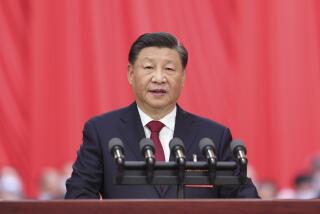China’s Irreconcilable Differences
- Share via
The abrupt dismissal of Communist Party General Secretary Hu Yaobang raises immediate uncertainties about the future of economic reform and the course of political succession in China. Hu, long assumed to be the chosen heir of 82-year-old Deng Xiaoping, has been a vigorous supporter of economic liberalization as well as an advocate of more relaxed political controls. Deng and Premier Zhao Ziyang, who takes over Hu’s job at least temporarily, have been quick to say that essential policies won’t be affected by the shake-up. But can China pursue the goal of a freer economy at the same time that it seeks to reimpose tighter party control over thought and behavior? The conflict between these two efforts seems both basic and irreconcilable.
Reassertion of the party’s primacy, demonstrated by the crackdown that followed student demonstrations in behalf of greater democracy and emphasized by the dismissal of Hu, has been further underscored by the punitive action taken against the physicist and prominent intellectual, Fang Lizhi. Fang has been stripped of his party membership for allegedly inciting the demonstrations that occurred in a number of cities during December. He is accused of promoting “bourgeois liberalism,” a catch-all category of ideological misdeeds that can include advocating capitalist activities and challenging the unique authority of the party. Whatever Fang’s actual role, his punishment is intended to serve dramatic notice to other intellectuals that dissident activities must end.
All this is seen as a victory for those conservatives in the hierarchy who have never been comfortable with Deng’s reformist policies, accurately sensing in them the means by which their own powers and the orthodoxy that they guard would be eroded. Deng nonetheless remains the man in charge, and there is no reason to think that his own interest in achieving a freer and more efficient economy has changed. But if that commitment endures, so does the contradiction that is inherent in it. Without a lessening of party interference, economic progress of the kind experienced by China in recent years can’t continue. Unless greater intellectual freedoms are permitted, modernization will be retarded. The contradiction remains unresolved. The struggle for control of China’s future goes on.
More to Read
Sign up for Essential California
The most important California stories and recommendations in your inbox every morning.
You may occasionally receive promotional content from the Los Angeles Times.












